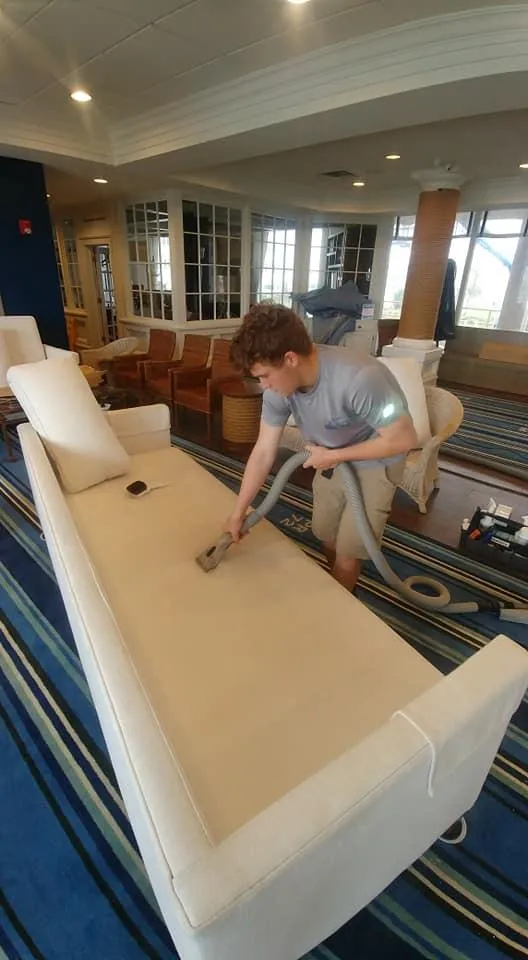
Extending the Life of Your Upholstery: Tips & Techniques from NJ Cleaning Pros
Introduction
Your upholstered furniture—sofas, chairs, ottomans—adds comfort and style to your home. But everyday use, spills, pets, and Florida’s unique climate can wear it down faster than you expect. Humidity, salt air near the coast, and high-traffic living all contribute to faded, stained, or musty upholstery.
The good news? With the right care and cleaning habits, you can dramatically extend the life of your furniture. In this blog, we’ll share expert upholstery care tips and professional techniques that keep your home looking fresh and inviting for years to come.
Why Upholstery Wears Out Quickly
To preserve your furniture, it’s important to first understand what causes wear and tear.
Everyday Use
Oils and sweat from skin gradually break down fabric fibers.
Pets leave behind fur, dander, and claw marks.
Kids add spills, crumbs, and constant activity.
Environmental Factors
Florida humidity: Encourages mildew and unpleasant odors.
Sunlight: Fades upholstery fabrics when furniture sits near windows.
Coastal air: Carries salt particles that settle into fabrics.
Maintenance Neglect
Without regular vacuuming, dirt acts like sandpaper and frays fabric.
Skipping professional cleanings lets deep-set stains and odors linger.
Tips & Techniques for Upholstery Care
Here are some simple, proactive steps to keep your upholstery fresh and durable.
Regular Vacuuming
Vacuum weekly using an upholstery attachment to remove surface dirt, dust, and pet hair before it settles deep into fibers.
Rotate Cushions
Switching cushions regularly ensures even wear, prevents sagging, and helps maintain shape.
Spot Cleaning Spills Immediately
Blot (never rub) spills with a clean cloth. For stubborn stains, use a fabric-appropriate cleaner.
Use Protective Covers
Slipcovers, throws, or armrest covers help protect high-use areas from oils, dirt, and UV damage.
Block Direct Sunlight
Position furniture away from windows or use blinds/curtains to protect against fading.
Professional Upholstery Cleaning
Schedule a deep cleaning every 12–18 months, or every 6–12 months if you have kids, pets, or high humidity exposure.
Step-by-Step Upholstery Care Guide
Step 1: Identify Fabric Type
Check manufacturer tags for cleaning codes (W, S, WS, or X) to know which methods are safe.
Step 2: Weekly Maintenance
Vacuum thoroughly, including crevices and under cushions.
Step 3: Handle Odors
Sprinkle baking soda lightly, let it sit for 15 minutes, then vacuum to absorb smells.
Step 4: Spot Cleaning
Address fresh spills quickly with mild cleaners approved for your fabric type.
Step 5: Professional Care
Hire a local upholstery cleaning expert for deep cleaning with steam or hot water extraction to remove allergens, bacteria, and deep stains.
FAQs About Upholstery Care
How often should upholstery be professionally cleaned?
At least once every 12–18 months. Homes with pets, children, or high humidity benefit from every 6–12 months.
Can steam cleaning damage my upholstery?
Not if done by professionals who understand fabric codes. Some fabrics require dry-clean-only methods.
How do I keep my sofa fresh between cleanings?
Vacuum weekly, rotate cushions, and use baking soda for odor control.
What’s the best way to protect upholstery from pets?
Use covers, vacuum more frequently, and schedule regular professional cleanings.
Does professional cleaning fix fading?
It removes dirt and refreshes appearance, but fading from sunlight can’t be reversed—only prevented.
Conclusion
Your upholstered furniture is an investment in comfort and style. Without proper care, daily use, environmental factors, and spills can shorten its lifespan. By vacuuming regularly, protecting it from sunlight, treating stains quickly, and scheduling professional upholstery cleanings, you can extend the life of your furniture significantly.
For Florida homeowners dealing with humidity, coastal air, and active households, partnering with a trusted local cleaning contractor ensures your upholstery stays fresh, healthy, and beautiful for years to come.